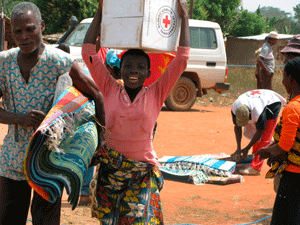
IT is with a deep sense of privilege and responsibility that we commemorate a unique milestone – 150 years of humanitarian action by the International Committee of the Red Cross (ICRC).
Since February 17 1863 the organisation has been dedicated to its exclusively humanitarian mission of protecting the lives and dignity of victims of armed conflict and other situations of violence, and meeting their essential humanitarian needs.
The nature of armed conflict and other forms of violence have continuously evolved. Modern forms of conflict have raised new challenges for humanitarian action.
It remains a sad reality that contemporary conflicts leave mainly women, children and the old vulnerable. Perhaps what is even more daunting is the increasing trend of attacks on humanitarian workers, their places of work and their equipment that are vital to saving lives. The human cost of armed conflicts and violence remains unacceptable with civilians bearing the brunt of the tragic consequences.
The two core ideas that remain pillars for the institution and the Red Cross and Red Crescent Movement for 150 years were suggested by Henry Dunant in a book entitled A Memory of Solferino. These are the creation of volunteer medical services to help the wounded on the battle field and an international agreement to protect the wounded, those attending to them and civilians affected by the armed conflict.
These ideas are as relevant today as they were when they were first stated. Despite numerous campaigns and initiatives to end them, war and violence continue to touch the lives of tens of millions of people around the world. Neutral, independent and impartial humanitarian action saves lives. It builds trust. It enables us to hold on to the essence of our humanity.
Beyond humanitarian action, it is imperative that all parties to conflicts, be they states or organised armed groups, abide by the appropriate legal framework that ensures protection for those who are not participating in conflict. The modern laws of war or international humanitarian law have evolved from the simple principle that an injured soldier who has laid down their weapon must receive medical aid if they need it and be respected when captured to a system of agreements that tightly regulates weapons and tactics.
It is these two areas — seemingly unrelated — that give the ICRC its dual purpose and durability. No matter how horrible the headlines are about a particular context, the essence of humanity that led to our birth 150 years ago survives and enables us to work. Ultimately, it is the individual and collective conviction of states, community leaders and individuals that has kept this organisation alive.
- Chamisa under fire over US$120K donation
- Mavhunga puts DeMbare into Chibuku quarterfinals
- Pension funds bet on Cabora Bassa oilfields
- Councils defy govt fire tender directive
Keep Reading
As we look towards our future as an organisation, we hope to be able to continue to adapt our expertise and experience from around the world to develop local partnerships and cooperation that have a positive impact on the lives of our beneficiaries.








